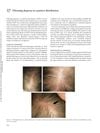7 citations,
August 2020 in “Plastic and reconstructive surgery. Global open” QR 678 and QR 678 Neo are safe and promote hair growth, potentially helping chemotherapy-induced hair loss.
November 2010 in “CRC Press eBooks” Modern hair restoration surgery has advanced greatly since 1959.
[object Object]  197 citations,
January 2019 in “Neuropsychopharmacology”
197 citations,
January 2019 in “Neuropsychopharmacology” Male and female bodies respond differently to stress, influenced by hormones and development stages, with implications for stress-related diseases.
 9 citations,
January 2014 in “Annals of Dermatology”
9 citations,
January 2014 in “Annals of Dermatology” Some breast cancer patients on hormonal therapy may develop male or female pattern hair loss, which can sometimes be improved with topical treatments.
 29 citations,
March 2021 in “Frontiers in Endocrinology”
29 citations,
March 2021 in “Frontiers in Endocrinology” Testosterone may influence COVID-19 severity and outcomes.
51 citations,
June 1970 in “British journal of dermatology/British journal of dermatology, Supplement” Antiandrogens may help treat conditions like excessive hair growth, prostate tumors, male baldness, and acne by blocking male hormone effects.
Digit ratio likely doesn't predict male hair loss.
 9 citations,
July 2018 in “Medicine”
9 citations,
July 2018 in “Medicine” Men with vertex baldness may have a higher risk of developing prostate cancer, but more research is needed to confirm this.
 7 citations,
July 2018 in “Biological & Pharmaceutical Bulletin”
7 citations,
July 2018 in “Biological & Pharmaceutical Bulletin” Phyllanthus urinaria extract may help treat hair loss by blocking a hair-related enzyme.
 January 2015 in “Springer eBooks”
January 2015 in “Springer eBooks” The pull test and wash test are cheap, easy methods to diagnose hair loss.
 16 citations,
September 1964 in “The journal of investigative dermatology/Journal of investigative dermatology”
16 citations,
September 1964 in “The journal of investigative dermatology/Journal of investigative dermatology” New compounds can block testosterone effects in rats and might help treat conditions like prostate cancer and acne.
 May 2019 in “Journal of the Dermatology Nurses’ Association”
May 2019 in “Journal of the Dermatology Nurses’ Association” Folliculitis decalvans mainly affects middle-aged African American men and is treated with antibiotics.
 121 citations,
November 2020 in “Endocrine”
121 citations,
November 2020 in “Endocrine” Male hormones like testosterone may make COVID-19 worse, and testing for sensitivity to these hormones could help predict how severe a patient's symptoms might be. Treatments that reduce these hormones are being explored.
 October 2024 in “Journal of Drugs in Dermatology”
October 2024 in “Journal of Drugs in Dermatology” Combining finasteride with minoxidil is more effective for male hair loss than using minoxidil alone.
4 citations,
March 2022 in “Journal of The American Academy of Dermatology” Finasteride use in young men with hair loss is linked to sexual dysfunction.
2 citations,
March 2022 in “Journal of Cosmetic Dermatology” Topical finasteride is a safe and effective treatment for pattern hair loss with fewer side effects than oral finasteride.
1 citations,
January 2022 in “Annals of Dermatology” Dutasteride is more effective than finasteride for long-term hair growth in men with androgenic alopecia.
 10 citations,
April 2018 in “Facial Plastic Surgery”
10 citations,
April 2018 in “Facial Plastic Surgery” The surgical technique of scalp advancement and pretrichial brow lift shortens the forehead and lifts brows, is good for women and transgender women with high foreheads, but not recommended for men and has some risks.
11 citations,
October 2021 in “Journal of The European Academy of Dermatology and Venereology” Topical finasteride is an effective and safer treatment for male hair loss.
[object Object] 1 citations,
November 2021 in “CRC Press eBooks” Common hair loss in men can be treated with minoxidil or finasteride.
 9 citations,
March 2019 in “European Journal of Sport Science”
9 citations,
March 2019 in “European Journal of Sport Science” New signs like changes in blood markers, physical symptoms, and behavioral shifts may help detect hidden steroid use in athletes.
 January 2018 in “Universidad Privada Antenor Orrego”
January 2018 in “Universidad Privada Antenor Orrego” Male pattern baldness may be an early sign of noncancerous prostate enlargement.
 1 citations,
January 2021 in “Nihon rinsho hifukaikai zasshi”
1 citations,
January 2021 in “Nihon rinsho hifukaikai zasshi” The document provides ways to tell alopecia areata from other similar hair loss conditions, using visual checks and specific tests.
 12 citations,
May 1989 in “Postgraduate Medicine”
12 citations,
May 1989 in “Postgraduate Medicine” The document concludes that hair loss is common and can be treated with medications like minoxidil or surgical options, and it significantly affects people's psychological well-being.
 April 2012 in “Informa Healthcare eBooks”
April 2012 in “Informa Healthcare eBooks” Fibrosing alopecia in a pattern distribution is a unique hair loss condition with inflammation and scarring, resembling but distinct from common balding.
December 2003 in “The journal of investigative dermatology/Journal of investigative dermatology” Glycerol may improve wound healing and prevent keloids, a device can measure itch intensity, male pattern baldness is highly heritable, and fumaric acid esters may work for psoriasis by causing cell death in T cells.
December 2020 in “ID on line. Revista de psicologia” Low-power laser therapy with essential oils effectively promotes new hair growth in male pattern baldness.
March 2021 in “Berkala Ilmu Kesehatan Kulit dan Kelamin” The best treatment for male pattern baldness is a combination of topical minoxidil and oral finasteride.
August 2021 in “Journal of The American Academy of Dermatology” Finasteride treatment changes hormone levels in male pattern baldness patients.
 9 citations,
November 2013 in “Presse Medicale”
9 citations,
November 2013 in “Presse Medicale” The document concludes that managing female hyperandrogenism requires a combination of identifying the cause, lifestyle changes, medication, and cosmetic treatments.
















